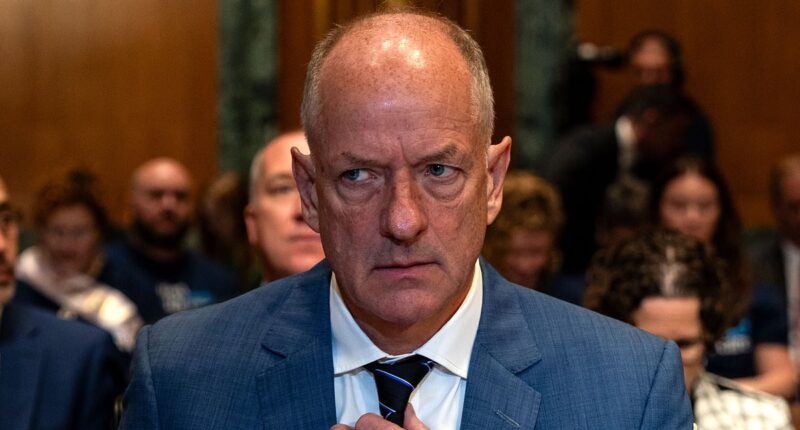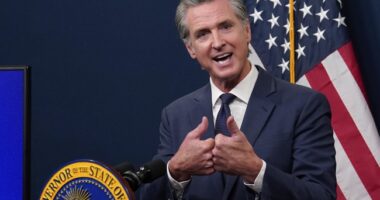UnitedHealth Group’s CEO has dramatically announced his resignation after the firm reported a poor financial outlook in its 2025 forecast.
Andrew Witty has been in charge of the company since 2021. He successfully navigated the crisis that arose following the assassination of UnitedHealthcare CEO Brian Thompson in Manhattan in December 2024.
His departure was announced Tuesday as the company said he was leaving for ‘personal reasons’, without elaborating.
Upon Witty’s resignation, UnitedHealth’s stock prices plummeted by 10%, impacting other health insurance companies like Humana and Elevance, which saw declines of between four and six percent in pre-market trading.
His departure came shortly after UnitedHealth reported its first earnings shortfall since 2008 in April. The company also alerted shareholders that it was revising its annual earnings forecast downward due to unexpected developments in the healthcare sector.
A surge in demand for healthcare services for Medicare recipients nationwide has cut into profits for many providers.
The healthcare industry-at-large is also still suffering from a rough 2024 amid lower government payments, elevated medical costs and public backlash to the sector after Thompson’s slaying.
The assassination brought a wave of outrage from disgruntled patients who claimed they were undercut or hurt by the insurer’s policies, which caused its stock to nosedive at the time.
Last month, UnitedHealth shareholders launched a lawsuit against the company for allegedly concealing how backlash from the killing hurt its business and profits.

The UnitedHealth Group CEO Andrew Witty has dramatically announced his resignation

Witty has overseen the healthcare giant since February 2021, and managed the crisis after UnitedHealthcare CEO Brian Thompson (pictured) was assassinated in Manhattan in December 2024
After Witty announced his resignation on Tuesday, the firm’s former CEO Chris Hemsley, who has been with the healthcare conglomerate for 28 years, was returning to the top role.
Kevin Gade, chief operating officer at Bahl and Gaynor, told Reuters that the resignation was only surprising in its abruptness, although the struggles that UnitedHealth has faced were well known in the industry.
‘The abruptness (of Witty’s exit) certainly is a surprise but no one should be surprised given the unique struggles of UNH versus peers,’ he said.
‘At a certain point, leadership must be held accountable.’
Before Thompson’s assassination, UnitedHealth was also facing scrutiny after it was the target of a cyberattack at its tech unit that shut down its healthcare processing systems used by 200 million Americans.
Witty previously came under the spotlight following Thompson’s shooting, as he was tasked with keeping the company afloat amid widespread backlash to its practices.
In the aftermath of the shooting, many expressed online outrage over the company’s history of rejecting necessary treatment – especially under Thompson – as they praised alleged gunman Luigi Mangione for his actions.

Witty, seen testifying to Congress in May 2024 after a cyberattack on UnitedHealth’s databases, was thrust into the limelight following Thompson’s assassination

In the aftermath of the shooting, many expressed online outrage over the company’s history of rejecting necessary treatment as they praised alleged gunman Luigi Mangione (seen during his perp walk in December 2024) for his actions
In response, Witty was seen in a leaked video to staff insisting that he was proud of ‘what this company does on behalf of people in need across the country.’
He even claimed few people ‘in the history of the US healthcare industry [have] had a biggest effect on American healthcare than Brian.’
Amid the fallout from Thompson’s slaying, a new lawsuit filed last month by UnitedHealth Group shareholders claimed it concealed the impact that public backlash was having on its business.
In a proposed class action filed in Manhattan federal court, shareholders said the insurer defrauded them after the December 4 shooting of Thompson by shifting away from strategies that led to higher-than-average claims denials, without revealing the impact on profitability.
UnitedHealth shares fell 22.4% on April 17, wiping out about $119 billion of market value, after the insurer cut its 2025 forecast for adjusted profit per share to between $26 and $26.50 from between $29.50 and $30.
The insurer cited higher costs in its Medicare business. It had issued the old forecast one day before Thompson’s death.
Shareholders said UnitedHealth had previously inflated its stock price by recklessly sticking with its old forecast, even as mounting public anger and an October 17 U.S. Senate report on claims denials caused it to become more patient-friendly.
















